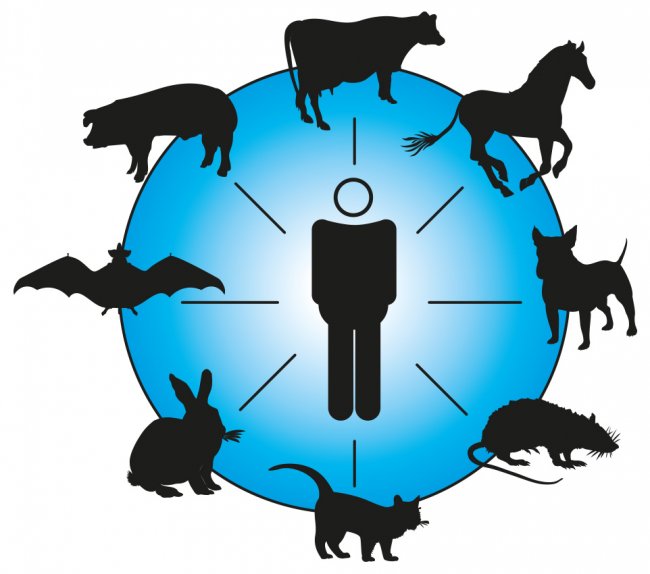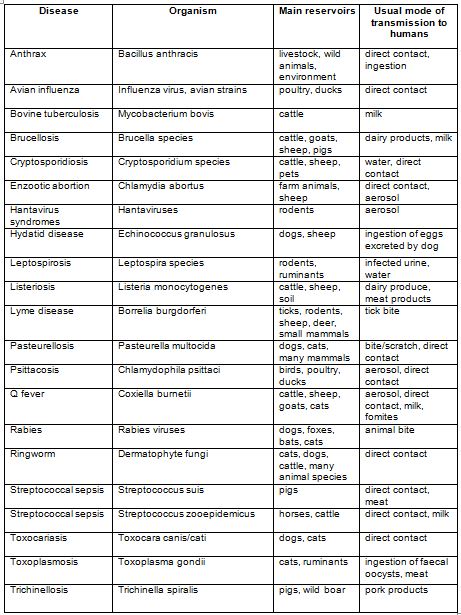Zoonoses (infections acquired from animals)
Infections acquired from animals are called Zoonoses. These infections normally occur in vertebrate animals (animal with a spinal cord) and can be passed on to humans who come in contact with the animal. This may happen directly through work (eg farmers) or leisure activities such as keeping pets or indirectly through contact with food and water.
Zoonotic diseases can be transmitted to humans in various ways which vary depending on the specific disease. In addition to direct contact with animals they may be transmitted by:
- transmission from person to person
- inhalation of spores / contaminated dust
- consumption of unpasteurised milk / dairy products or undercooked/contaminated food
- consumption of contaminated water
- skin exposure to spores / contaminated water
- animal or insect bites/scratches
PHA undertakes surveillance of a range of zoonotic infections.
Epidemiological data
The latest laboratory confirmed cases of zoonotic disease in humans in Northern Ireland can be viewed at NI Zoonoses website data.xlsx
England and Wales epidemiological data can be viewed at: https://www.gov.uk/government/collections/zoonotic-diseases-zoonoses-guidance-data-and-analysis
Table of zoonotic diseases and organisms
For further information on Zoonotic Diseases and Organisms click here.
Zoonoses acquired at work
Many zoonotic infections may be contracted at work usually through direct contact with infected animals. The true incidence of zoonoses acquired at work in the UK is unknown for most infections.
Specific regulations apply in the workplace to prevent, control the spread of, and report zoonotic infections. These are detailed below:
Regulations applicable in the occupational setting
- Control of Substances Hazardous to Health (COSSH) 2002.Micro-organisms which are hazardous to human health are included as substances hazardous to health in these regulations. As potentially zoonotic pathogens may be present wherever there are animals, an assessment of the hazard and its associated risk must be undertaken in such situations, and appropriate controls put in place.
Detailed advice on this process is available from the HSE - http://www.hse.gov.uk/risk/fivesteps.htm
- Reporting of Injuries diseases and dangerous occurrences (RIDDOR) 1985 www.hse.gov.uk/riddor/riddor.htmReporting accidents and ill health at work is a legal requirement, and included under the legislation are occupationally-acquired zoonoses.
Occupational settings
A wide variety of occupations and premises exist where contact with animals or their products may occur. These include professions such as abattoir workers, farmers and farm workers and forestry workers.
Avian influenza
Avian Influenza, commonly referred to as bird flu, is a contagious viral infection that primarily affects birds, including chickens, ducks, and wild birds. The virus can occasionally spread to humans, leading to severe health concerns. In Northern Ireland, UK, guidance on Avian Influenza is provided by the Department of Agriculture, Environment, and Rural Affairs (DAERA). This guidance outlines measures to prevent the spread of the virus, such as biosecurity measures for poultry keepers, monitoring and reporting any signs of infection in birds, and restrictions on the movement of poultry to prevent further transmission. It is crucial for both poultry keepers and the public to stay informed and follow these guidelines to protect both bird populations and public health.
Further information on avian influenza (bird flu) including symptoms, diagnosis, management and epidemiology is available through following UKHSA website: Avian influenza: guidance, data and analysis - GOV.UK (www.gov.uk)
For the latest Northern Ireland situation please visit:
Latest Situation | Department of Agriculture, Environment and Rural Affairs (daera-ni.gov.uk)
For the latest guidance on wild birds and advice visit:
Wild Birds and Advice for the Public | Department of Agriculture, Environment and Rural Affairs (daera-ni.gov.uk)
To report a dead wild bird please use the DAERA online tool:
Report dead wild birds - GOV.UK (www.gov.uk)
Useful links on zoonoses and lyme disease
For further information on Zoonoses see:
- Public Health England - http://www.hse.gov.uk/risk/controlling-risks.htm
- Department of Department of Agriculture, Environment and Rural Affairs - https://www.daera-ni.gov.uk/articles/zoonotic-diseases

